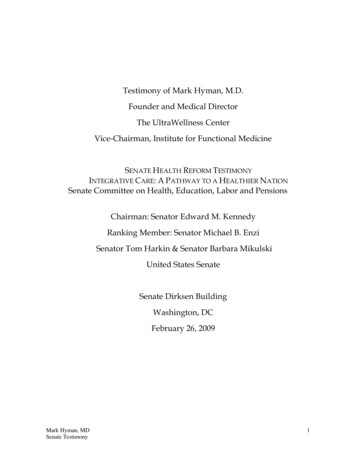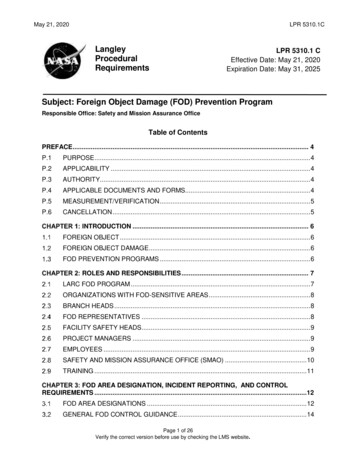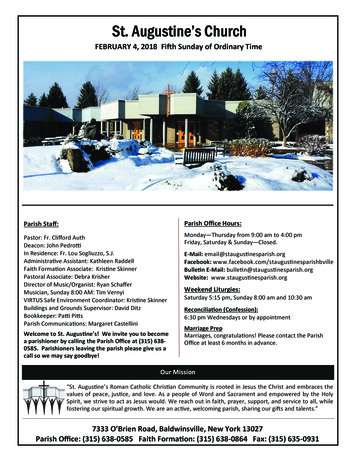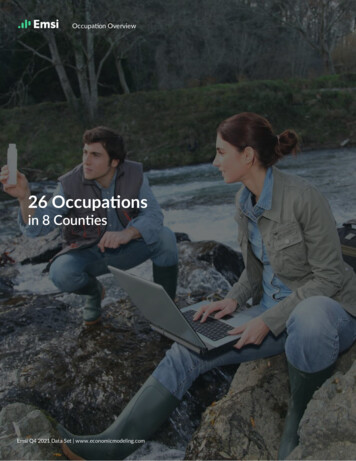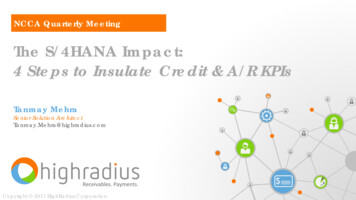
Transcription
DEPARTMENT OF HEALTH AND HUMAN SERVICESOFFICE OF NATIONAL SECURITYTESTIMONY BEFORESENATE HEALTH, EDUCATION, LABOR, AND PENSIONS COMMITTEEPROTECTING U.S. BIOMEDICAL RESEARCH:EFFORTS TO PREVENT UNDUE FOREIGN INFLUENCELISA AGUIRRE, J.D.ACTING DIRECTOR,OFFICE OF NATIONAL SECURITYAPRIL 22, 20211
Good morning Chair Murray, Ranking Member Burr, and distinguished members of theCommittee. It is an honor to appear before you today to discuss the Office of National Security’s(ONS) mission. ONS is the Department of Health and Human Services’ (HHS) point of contactfor the Intelligence Community (IC), and is responsible for coordination with the IC and forintelligence support to HHS senior policy makers and consumers of intelligence across theDepartment. Additionally, ONS is responsible for safeguarding classified national securityinformation across the Department and for the appropriate sharing of intelligence, homelandsecurity, and law enforcement information externally and, internally within HHS, among theOperating and Staff Divisions. ONS is headed by the Director, who reports directly to the HHSDeputy Secretary. The Director also serves as the National Security Advisor to the Secretary andin this role is the HHS Secretary’s Senior Intelligence Official on national security, intelligence,and counterintelligence issues. The Director also serves as the Department’s Federal SeniorIntelligence Coordinator (FSIC).ONS’ vision is for HHS personnel to successfully accomplish missions worldwide in asecurity-informed manner and with the actionable intelligence needed, at the right time, foroperational and policy decisions. ONS’ responsibilities include: Integrating intelligence andsecurity information into HHS policy and operational decisions; assessing, anticipating, andwarning of potential security threats to the Department and our national security; and, providingpolicy guidance on and managing the Office of the Secretary’s implementation of theDepartment’s security, intelligence, and counterintelligence programs. ONS’ programs includenational security adjudication, classified national security information management, securecompartmented information facilities management, communications security, safeguarding andsharing of classified information, cyber threat intelligence, and counterintelligence.2
ONS’ counterintelligence mission is to conduct activities to identify, detect, deter,neutralize, mitigate and protect Department personnel, information technology systems, andcritical assets from insider threats, foreign intelligence entities, and foreign influence. While notpervasive, some foreign government actors target top scientific and technical expertise sectors inthe United States in an effort to enhance their competitive advantage in the fields of research andmedical/technical innovations. These foreign actors seek to exploit government, private-sector,and academic development efforts in order to advance their own national interests whileproviding sponsorship to a variety of non-traditional activities to steal and co-opt U.S. research;specifically, targeting bio-technology companies and university research centers. Nontraditional collectors can include foreign researchers who have been recruited by foreign talentrecruitment programs, cyber hackers, and foreign students who have been co-opted or coercedinto spying for foreign governments and their intelligence services. There is substantial reportingsuggesting non-traditional collector activity against U.S. equities in an effort to misappropriatesensitive U.S. research and development data and information.In an effort to mitigate risks to HHS equities, ONS conducts all-source intelligenceanalysis on foreign nationals attempting to obtain positions within HHS and affiliates with HHSequities. ONS conducts vetting and research related to grants, funding overlap, scholarships,foreign travel, foreign associations, foreign recruitment activities, and foreign patents. HHSONS works jointly with HHS Operating and Staff Divisions, and interagency partners, to assistin determining risk evaluations in research engagements. ONS non-traditional collection researchis provided to HHS Office of Inspector General and the Federal Bureau of Investigation (FBI) ascounterintelligence referrals.3
Also, ONS has been working within the Department on a counterintelligence educationand awareness program, titled: Safeguarding Science. ONS has begun work on a program planfor extramural education and awareness training with the National Counterintelligence TaskForce, a multi-agency task force led by the FBI. This training will likely be targeted towardNational Institutes of Health (NIH) extramural staff (employees, contractors, fellows, andtrainees/volunteers) and academic institutions applying for NIH grants (faculty, staff, postdoctoral associates, graduate research assistants, trainees/volunteers). While an ONS staffmember, on detail to ONS from the FBI, has been involved in extramural outreach over the lastyear, we are excited about the development of a comprehensive plan for extramural outreach.Additionally, ONS has a foreign visitor vetting program. ONS conducts vetting of foreignnational visitors for 10 Operating Divisions and 14 Staff Divisions. ONS also conducts vettingfor foreign national employees who will be authorized access to government systems and data.In 2020, ONS vetted 13,138 foreign national visitors; 7936 were to NIH. ONS also vetted 2,854foreign national employees; 1,574 were to be employed in NIH. ONS also has acounterintelligence review program, where we review:Material Transfer Agreements (transfers from HHS to foreign governments);Supply Chain Risk Management (SCRM) from the counterintelligence angle;CI Review of FDA Emergency Use Authorizations; andCommittee on Foreign Investment in the U.S. (CFIUS) cases, as Department lead.ONS also has a program that focuses on the non-traditional collection vulnerabilities withinHHS.ONS has worked closely in several ways with NIH, as we do with other OperatingDivisions. One example: ONS receives information from the NIH Deputy Director for4
Extramural Research (Dr. Lauer). ONS reviews correspondence received related to foreignnationals who are active participants in or seeking to engage in research and grant activitiesinvolving HHS equities. In an effort to identify and deter potential foreign influence on U.S.research integrity, ONS conducts all-source research on foreign nationals that pose a potentialcounterintelligence and/or non-traditional collection concern to HHS equities. If ONS identifiesa potential concern, our office produces a formal product on our findings and presents the data tothe appropriate HHS components. Since July 2020, ONS has received 78 portal emails from theNIH Deputy Director for Extramural Research, and from these there were nine findings. Thosenine findings were put into intelligence products and provided to the NIH Deputy Director forExtramural Research counterintelligence and insider threat staff, and when appropriate, referredto OIG.In closing, ONS has worked significantly over the last few years to further enhance ourcounterintelligence programs, in coordination with HHS Operating and Staff Divisions, and weare dedicated to protecting Department personnel, information technology systems, and criticalassets. I will be happy to answer any questions.5
specifically, targeting bio-technology companies and university research centers. Non-traditional collectors can include foreign researchers who have been recruited by foreign talent recruitment programs, cyber hackers, and foreign students who have been co-opted or coerced into spying for foreign governments and their intelligence services.
